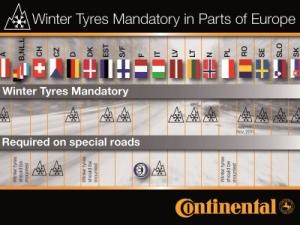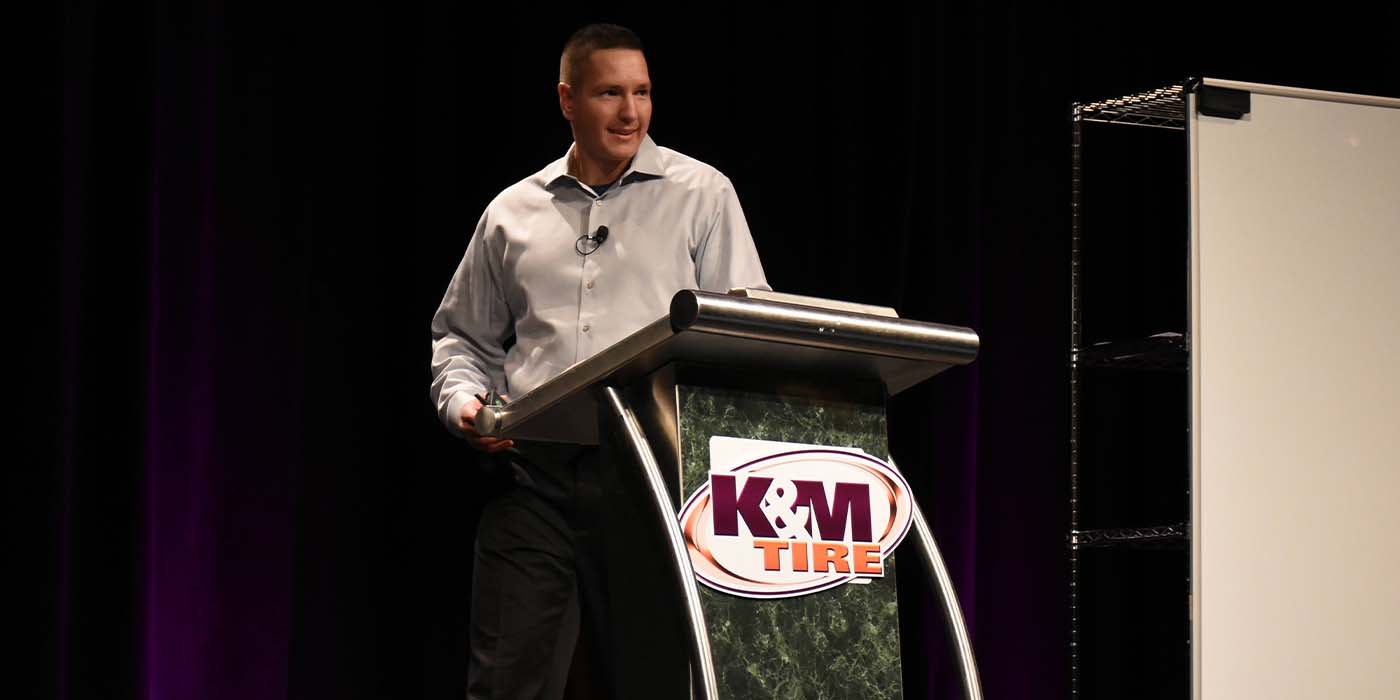It’s getting cold out there, and tiremaker Continental notes "there are no Europe-wide regulations for winter tires in sight." So until the day when nations throughout the region are encouraged to sign up to the tire world’s equivalent of EMU, those planning to take their vehicles across the Channel during the coming cold months need to study up on the various national regulations in effect.
for winter tires in sight." So until the day when nations throughout the region are encouraged to sign up to the tire world’s equivalent of EMU, those planning to take their vehicles across the Channel during the coming cold months need to study up on the various national regulations in effect.
Continental has made the task easier by outlining the winter tire rules currently in effect in Europe.
Of the European countries included in Conti’s list, specific cold weather tires are mandatory in just over half, although several countries do not require foreign registered vehicles to have them fitted. Below is Continental’s latest winter tire rule information, listed country-by-country.
Austria:
In Austria, winter tires are mandatory from Nov. 1 to April 15. During this time, cars on the road in winter conditions may not be equipped with summer tires. Winter tires must have a tread depth of at least 4 mm. In addition, snow chains can also be mandated for certain stretches of road. Studs are permitted on vehicles up to 3.5 tons; speed limits apply.
Belgium, Netherlands and Luxembourg:
Belgium, the Netherlands and Luxembourg aren’t exactly renowned for winter sports. Nevertheless, vehicles should be equipped with winter tires: in the hilly regions along the German border, snow is nearly a certainty, and in the other regions, temperatures below freezing are common in winter. Without winter tires, braking distances become longer and longer. Winter tires are not mandatory; spikes are forbidden.
Czech Republic:
By law, winter tires are mandatory in Czech Republic but only on certain highways, such as the D 1. This winter tire obligation is effective from Nov. 1 until March 31 and is indicated by special road signs.
Denmark:
The Danes are not required to have winter tires, but a large percentage do change them. Spikes are permitted but are rarely used.
Estonia:
Winter tires are mandatory from Dec. 1 to the end of February. Depending on the weather conditions, however, it is possible that this period starts earlier or ends later, as specified. Spikes are not permitted.
Finland:
In Finland, winter tires are mandatory from Dec. 1 through the end of February. Since 1999, this also applies to foreign vehicles.
France:
In France, winter tires are not mandatory. Snow chains may be obligatory for certain stretches. Studded tires can be fit on cars as well (from the beginning of November to the end of March, with speed limits of 90 km/h out of town, 50 km/h in town). The car must have a sticker indicating that it is equipped with studded tires. Despite the fact that winter tires are not mandatory, drivers should by no means do without, especially in the French Alps.
Germany:
According to German road traffic regulations (StVO), motorists are required to adapt the equipment of their car to the weather conditions, which is why we speak of the “situation-based winter tire requirement.” Motorists who violate this regulation are subject to fines and may have punitive points added to their driving records.
An amendment is likely to be made to the law this winter, specifying the weather conditions and tire qualities in greater detail. An increase in fines is also expected.
Italy:
The use of winter tires is not a requirement, although they can be specified for certain stretches. There are no specific regulations regarding the use of snow chains. Whoever wants to drive on studded tires must comply with the speed limits (90 km/h out of town and 50 km/h in town).
Latvia:
Like in Finland, winter tires are mandatory from Dec. 1 through the end of February in Latvia.
Lithuania:
Winter tires are obligatory here from Nov. 1 to April 1.
Norway:
Foreign vehicles in Norway are not required to have winter tires, but it is highly recommended. In general, all motorists are required to equip their vehicles with tires that are suited to the weather conditions and — if necessary — to carry snow chains.
Poland:
Whoever drives to Poland in winter is not required to have winter tires. However, since there is little snow removal in the countryside, driving without reliable winter tires is a major risk.
Romania:
There currently are no regulations regarding winter tires in Romania. The Ministry of Transportation has announced that the government will approve an emergency ordinance in December 2010 requiring motorists to equip their vehicles with winter tires from Nov. 1 to March 31. The new regulation will go into effect in 2011.
Slovakia:
Winter tires are mandatory in Slovakia.
Slovenia:
Winter tires are obligatory from Nov. 15 to March 15 in Slovenia. This means either winter tires or radial tires with a minimum tread depth of 4 mm. But according to Slovenian law, two winter tires per vehicle are sufficient. Experts, however, highly recommend that winter tires be fit on all wheels.
Sweden:
Although winter tires are mandatory for Swedish vehicles during the cold time of year, foreign vehicles aren’t required to have winter tires.
Switzerland:
Winter tires are not mandatory in Switzerland. However, they are recommended, since if an accident that is proven to have been caused by summer tires occurs, the driver may be held jointly liable, which can have significant consequences. Swiss collision insurance does not cover such cases. Snow chains and studs are optional. They may, however, be mandated by signs (also on all-wheel-drive vehicles). Studs are not permitted on most motorways in Switzerland. A speed limit of 80 km/h out of town and 50 km/h in town applies when driving on studded tires. (Tyres & Accessories)













